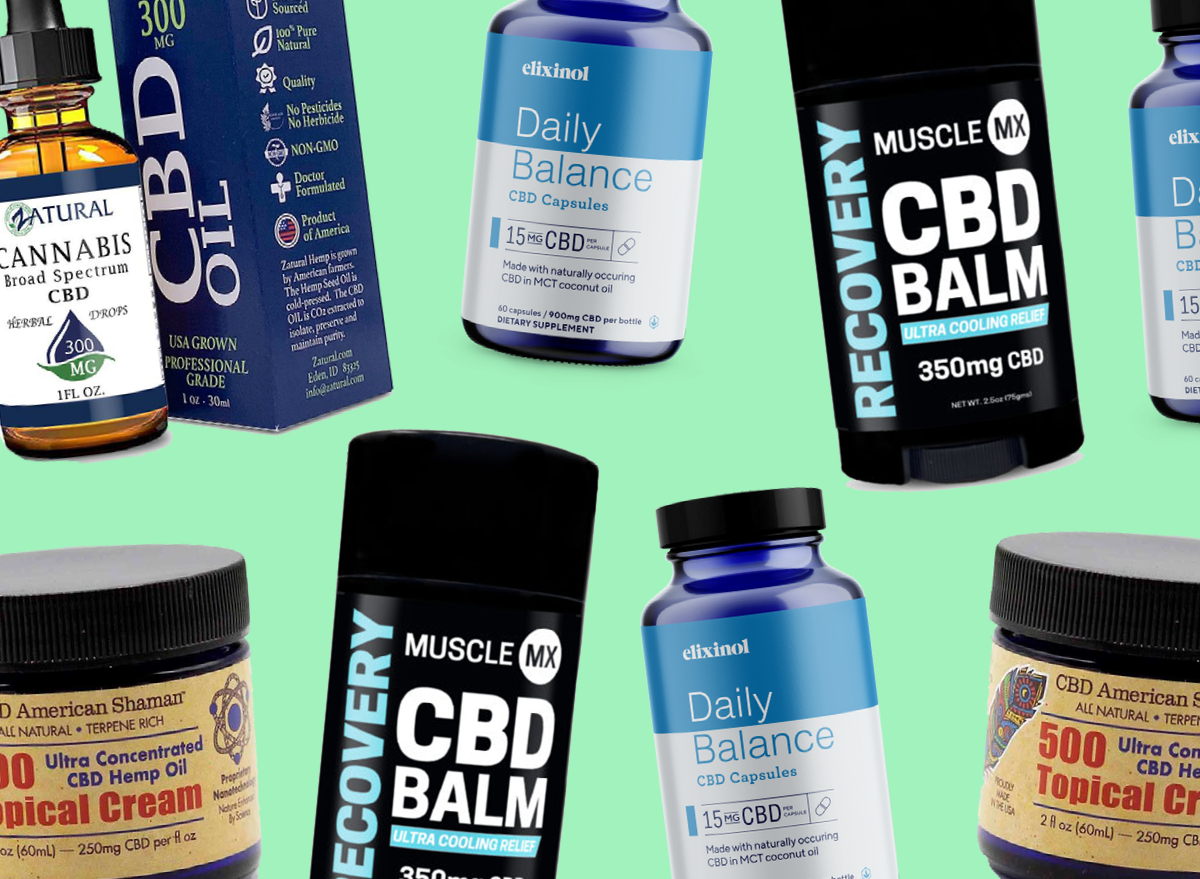5 Side Effects of Taking CBD, According to Science

There is a lot of skepticism around CBD, not to mention it often comes at a premium price. Have you noticed a latte enhanced with the natural plant-based oil can cost you an additional $4 to $5? Still, there are a few positive side effects of taking CBD that may interest you.
There are also many ways you can get your daily fix of CBD. For example, Muscle MX's CBD Cooling Balm, can help muscles to recover faster after a grueling workout. Or, if you need assistance falling asleep at night, Elixinol's Good Night CBD Capsules (which include melatonin) could do just the trick for you. A traditional tincture, such as Nuleaf's Full Spectrum CBD Oil, is also a good route to go, as it easily allows you to add droplets into beverages.
If you decide to take CBD supplements, Vince Sanders, founder and president of CBD American Shaman, advises only taking ones that are treated with nanotechnology.
"This allows for a 90% or higher bioavailability, which means most of what you consume is actually being absorbed into the body," he says. "More absorption means you'll get more of the benefits associated with regular CBD consumption."
Below, you'll see five side effects of taking CBD. And after, don't miss The One Vitamin Doctors Are Urging Everyone to Take Right Now.
When taking CBD, you may…
Experience temporary stress relief

According to the National Institute on Drug Abuse (NIDA), taking CBD has been shown to reduce stress in rats. In addition, a 2010 study published in the Journal of Psychopharmacology found a positive association between CBD and people with a social anxiety disorder (SAD). Those who took 400 milligrams of CBD experienced a significant decrease in anxiety in comparison with those who took a placebo.
As Sanders notes, CBD works with the body's endocannabinoid system (ECS) which helps to create a calming effect. In fact, a 2019 study published in the journal Frontiers in Psychiatry suggests that CBD's effects on ECS may be an effective treatment for substance use disorder.
"It calms the brain by binding with receptors associated with fearfulness and anxiousness, and it soothes the body by reducing the physiologic stress responses associated with negative feelings," he says.
Here's more information on CBD for anxiety.
Alleviate chronic pain

Research has shown that taking CBD capsules, tinctures, or even applying topical creams may help to alleviate chronic pain. For example, a small 2018 study published in the journal Transplantation Proceedings found that CBD was successful in improving pain levels in six out of seven participants who experienced chronic pain after having kidney transplants.
"When it comes to pain management, the body already produces anandamide, and CBD works with this compound to reduce the perception of pain," says Sanders.
Anandamide, which translates to "internal bliss" in Sanskrit, is an endogenous cannabinoid the body releases when it first senses pain. Anandamide binds to a receptor concentrated in both the brain the central nervous system called CB1 and effectively suppresses the feeling of pain by blocking the signaling.
CBD doesn't bind to the CB1 receptor—instead, it changes the shape of the receptor. Some experts believe that CBD may prevent this receptor, as well as another receptor called CB2, from being broken down, which ultimately allows them to have a greater effect on the body.
Get even more healthy tips straight to your inbox by signing up for our newsletter!
Reduce inflammation in the body

"CBD can block chemical reactions in the body that trigger inflammatory responses," says Sanders.
It's true—CBD binds to what's called the TRPV1 receptors, which are known to mediate pain perception, inflammation, and even body temperature. According to Harvard Medical School, chronic inflammation is associated with heart disease, diabetes, cancer, arthritis, and Chron's disease.
Improve mood

Anandamide plays a role in mood regulation. As we know, anandamide binds to the CB1 receptor, and since CBD can stop the breakdown of that receptor that also means it stops the breakdown of anandamide. When we retain more anandamide, we maintain a blissful feeling.
"CBD interacts with the body's endocannabinoid system to help regulate the central nervous system, which can have a positive impact and help stabilize people's moods," says Sanders.
Be sure to check out 17 Therapeutic Foods to Help Cope With Stress and Improve Your Mood for more tips.
Manage epilepsy symptoms

While CBD, as of now, hasn't been shown to treat epilepsy, it has been shown to help people with the condition manage their symptoms—particularly seizures.
"CBD has been shown to help with balance and homeostasis in the body making it a good resource for those who suffer from epilepsy," says Sanders. "To achieve homeostasis, the majority of people consume 10 to 20 milligrams per day."
More research is needed to identify a stronger association, however, strict government regulations around cannabis tend to interfere with this progress.
For more, be sure to read What Happens to Your Body on CBD.








